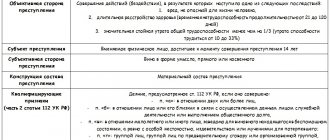Three main types of bodily injury
The criterion for the gradation of crimes and the amount of punishment is the consequences caused by the beating. The Criminal Code lists articles for intentionally causing damage in order of increasing severity of consequences with increased liability:
- Infliction of battery (Article 116 of the Criminal Code of the Russian Federation and 116.1 of the Criminal Code of the Russian Federation). On the same level as this type of act is Article 115 of the Criminal Code of the Russian Federation, which provides for liability for causing minor bodily injury;
- Moderate bodily injury. When considering criminal cases of this category, termination is possible due to reconciliation between the perpetrator and the victim. Otherwise, the punishment for such damage is in the form of imprisonment;
- Causing grievous bodily harm – Article 111 of the Criminal Code of the Russian Federation. It provides for maximum sentences in the form of imprisonment, in comparison with other crimes against health.
Punishment for beatings
Beatings are differentiated; liability for such actions is provided for in two articles:
- Article 116 of the Criminal Code of the Russian Federation - for beating those who are part of the circle of loved ones. These include parents, spouses, children, grandmothers, grandchildren, guardians and trustees, adopted children. Also among those involved will be those who started a fight for hooligan reasons, as well as for national reasons;
- Article 116.1 of the Criminal Code of the Russian Federation - for repeated beating. That is, if there is a previously assigned administrative punishment for such actions.
Liability for battery varies depending on specific circumstances. But a beating that does not result in consequences in the form of health problems (and does not fall under any of the listed criteria) does not entail criminal liability.
In the first case, the punishment ranges from 360 hours of compulsory work to 2 years of isolation .
In case of repeated beatings, the penalty is a fine of up to 40,000 rubles, or compulsory labor (up to 240 hours), as well as correctional labor ( up to 6 months ).
In the case of minor injuries, the punishment is similar in type, but somewhat harsher in size (up to 480 hours of compulsory labor , up to a year of correctional labor). If there is a proven hooligan or national motive (Part 2 of Article 115 of the Criminal Code of the Russian Federation), the punishment reaches 2 years in a penal colony.
○ Responsibility and punishment for assault.
The Criminal Code provides for the following as punishment for assault:
- A criminal fine of up to 40 thousand rubles.
- Mandatory work.
- Correctional work.
- Arrest.
- Restriction of freedom.
- Deprivation of liberty.
What punishment will be assigned to your offender will be decided by the court, based on the severity of the harm caused, the presence of aggravating circumstances, such as alcohol intoxication, the offender’s criminal record, relapse, etc.
[ ]
Minor bodily injury
What is the difference between beatings and mild injuries?
Batterings do not always manifest themselves in the form of bruises, scratches, cuts, or hematomas. For liability for battery under Article 116 of the Criminal Code, it is sufficient to cause severe physical pain to the victim. Criminal liability for causing minor bodily harm involves deterioration in health for a period not exceeding 3 weeks. This is recorded by a forensic medical examination (see how to remove a beating).
How to prove that beatings were caused if there are no noticeable injuries on the body?
Other evidence must be provided, depending on the specific situation:
- this may be recordings from a surveillance camera (if the beating occurred in a public place);
- questioning of eyewitnesses;
- as well as those who provided assistance.
Under no circumstances refuse to undergo an examination if there are no bruises. Only a specialist can correctly record the consequences of a beating: if the physical manifestations of the beating are not visible, he will note in the document complaints of headaches, fatigue, dizziness, and pain in the internal organs. Such an examination will also serve as evidence of the accusation (see where to go to have the beatings removed).
If the skin is damaged, go to the emergency room. If you were given a referral by the police department, or undergo an examination at a paid examination bureau. A similar procedure for confirming harm to health is provided for light beatings.
What is the procedure
The statement of beatings must be sent to the magistrate’s court at the offender’s place of residence. The victim independently defends his accusatory position in court, in the absence of the prosecutor. The same rule applies in the presence of a mild health disorder.
The private nature of cases of beatings (as well as in the case of minor harm) provides not only for the obligation of the victim to independently secure charges, but also for the possibility of termination at any stage of the proceedings. A private prosecutor is given the right to withdraw a statement of battery from the police or court. In cases of public prosecution it is impossible to do so.
Previously, police officers were required to carry out a check on the received application, initiate a case and conduct an inquiry, and then send the materials to the court for consideration in the usual manner. Thus, if the beatings were caused as a result of hooliganism, then the “police” procedure for initiating a case was directly provided for by Art. 20 Code of Criminal Procedure of the Russian Federation.
Today this rule applies only under Art. 115 part 2 of the Criminal Code of the Russian Federation.
For example , if a person was beaten on the street by two strangers for hooligan reasons, then, regardless of health disorder or the presence of severe physical pain, the accusation against the criminal will be supported by a representative of the state.
In this case, a statement of the established form is written to the police.
Statement to the police
To the head of the police department _________(specify which) district of the city_________(specify which) Ivanova I.I., residing at the address: _______(specify) phone number _________________
Statement
I ask that two unknown persons be brought to criminal responsibility who, on January 1, 2021, in the Lenin Park in the city of _______________, at approximately 11:30 p.m., caused me bodily harm for no reason. One of them asked me for a cigarette, after a negative answer, he punched me in the face, immediately after that the second participant kicked me three times in the legs, after which I fell. Then the unknown persons kicked me several more times on the body, and then left. I report the following signs of the persons who beat me: ________________ (indicate which ones and what they were wearing, if you remember). As a result of the actions of unknown persons, I suffered the following bodily injuries: an abrasion of the lip, hematomas of both lower extremities, an abrasion of the right forearm. I undertake to undergo a medical examination. On criminal liability for knowingly false denunciation in accordance with Art. 306 of the Criminal Code of the Russian Federation warned.
Number ___________ signature ___________
○ The severity of beatings according to the law.
I note that the severity of the beating is determined as part of the pre-investigation check based on the conclusion issued by forensic experts .
To determine the degree of severity, it is not enough to simply remove the beatings; it is necessary to obtain an appropriate expert opinion.
In the practice of forensic medical examination and according to the norms of criminal law, there are 3 degrees of harm to health:
1) A mild degree does not cause permanent disability or short-term discomfort;
2) Moderate health harm entails a long-term illness, health disorder, or disruption of the functioning of a body system or organ for a period of 21 days or more. Such harm can also be characterized by a significant permanent loss of general ability to work;
3) Serious harm to health is caused by injury to the skull, brain contusions, and fractures, both open and closed.
Once again, I would like to draw your attention to the fact that the degree of harm caused can only be established as a result of a forensic medical examination. A traumatologist, surgeon, emergency room paramedic and other ordinary doctors cannot determine the degree of harm caused by beatings.
[ ]
Moderate bodily injury
Battery of moderate severity is a serious crime and carries a penalty of imprisonment. To qualify the actions of the batterer, a forensic medical examination of the beatings inflicted is carried out. Her findings confirm the need for treatment of the victim for at least three weeks.
Depending on the situation in which the bodily harm was inflicted, the judge's sentence may be increased (see punishment for beating a person).
For example , if two friends were beaten at the same time. Both were in hospital for 24 days, then the perpetrator may be sentenced to imprisonment for up to 5 years (instead of 3 years, which are provided for in Article 112 of the Criminal Code of the Russian Federation for beating one victim).
The same punishment (up to 5 years) awaits someone who used moderate violence against a child under 14 years of age.
Main features
The main signs of beatings are causing minor harm to health .
What is this harm?
Firstly, this is a short-term, not entirely noticeable health disorder.
How is such a concept characterized? The health disorder should last about three weeks , perhaps less, but no more. If the disorder is of a more prolonged nature, the harm is considered grave .
Also, if beaten, the employee cannot visit the place where they perform their work function for some time. Therefore, temporary disability is also understood as a sign of beating.
Serious bodily harm
Serious harm to health is also determined by a forensic medical expert. Such harm has serious consequences for the health of the victim. Sometimes irreversible and not treatable. According to the rules approved by the Decree of the Government of the Russian Federation, harm can be considered grave in the event of:
- inflicting life-threatening injuries on him;
- the onset of a mental disorder in the victim;
- his addiction to drugs.
For example , a criminal stabbed a woman in the face. There was no danger to the victim's life. But the deep cuts left scars. The actions of the attacker constitute a crime under Article 111 of the Criminal Code of the Russian Federation, since grave harm is expressed by the sign of “indelible disfigurement of the face.” The punishment that can be imposed on the perpetrator is imprisonment for a term of up to 12 years.
The most difficult cases are those where grievous bodily harm resulted in the death of the victim. In such cases, it is difficult to establish a cause-and-effect relationship between the actions of the batterer and the occurrence of death.
For example , after a man was severely beaten with a bat, his death was recorded. The cause was said to be bilateral pneumonia. At the same time, experts established that the bodily injuries of the deceased corresponded to grievous harm. It was they that led to the weakening of the body, the rapid development of pneumonia and death. The offender inflicted the beatings intentionally, but did not think about the consequences in the form of weakening of the body and death. The perpetrator will be charged with intentionally causing grievous bodily harm resulting in death through negligence. According to the court verdict, punishment is possible for up to 15 years.
Question:
What kind of article will the person who beat me have if I was in treatment for exactly three weeks?
In your case, the crime of the perpetrator will be qualified under Part 1 of Article 115 of the Criminal Code of the Russian Federation, since his actions caused a short-term disorder in your health. According to the Rules for Determining the Severity of Health Harm, a disorder that requires treatment for 21 days inclusive is considered short-term.
Question:
How will the coach who beat my child be punished?
Criminal liability of a coach for beatings will occur only if there is a health disorder, that is, under Art. 115 of the Criminal Code of the Russian Federation. If a child suffers physical pain without consequences, liability under Art. 116 of the Criminal Code of the Russian Federation will be avoided by the coach (taking into account changes dated July 14, 2016 in the Criminal Code of the Russian Federation). At the same time, as an official who, due to his professional duties, was entrusted with a child, the coach can be held accountable for cruelty to minors (Article 156 of the Criminal Code of the Russian Federation). Moreover, in addition to punishment in the form of imprisonment, he may be deprived of the right to work in a children's institution for a period of up to three years.
Question:
What will happen - murder or infliction of grievous bodily harm resulting in death, if after being stabbed in the chest the victim died a week later?
If the blow was struck with a knife directly to the heart area, the actions of the perpetrator contain signs of murder, and it does not matter when the victim died - on the same day or after a while. Based on judicial practice, it is usually believed that when delivering such a blow to a vital organ, the accused could not help but know that the consequences could be death. Consequently, negligence in relation to the consequences is excluded, intent is confirmed.
Question:
What does “national motive” mean when beating?
State policy has long been promoting counteraction to manifestations of extremism. Nationally motivated beating means infliction of bodily harm due to hatred of a certain group of people belonging to a particular nationality. Such a motive is currently directly provided for in the disposition of Article 116 of the Criminal Code of the Russian Federation and is one of the mandatory signs of the act. Also, a national motive may be provided in the form of an additional qualifying feature (for example, Part 2 of Article 115 of the Criminal Code of the Russian Federation) or be an aggravating circumstance when assigning punishment.
- Criminal Code of the Russian Federation Article 111. Intentional infliction of grievous bodily harm
- Criminal Code of the Russian Federation Article 112. Intentional infliction of moderate harm to health
- Criminal Code of the Russian Federation Article 115. Intentional infliction of minor harm to health
Beatings. Definition of the concept
Ushakov’s explanatory dictionary defines beatings as “blows on a living body.”
Efremova’s explanatory dictionary defines beatings as “1) Blows inflicted on someone. 2) Traces of such impacts"
Kuznetsov’s explanatory dictionary defines beatings as “blows to the body that cause pain or injury.”
- For more information about beatings, liability for which is provided for in Articles 116, 116.1 of the Criminal Code of the Russian Federation, and Article 6.1.1 of the Code of Administrative Offenses of the Russian Federation, see the publication: “Beatings under Art. Criminal Code of the Russian Federation and Code of Administrative Offenses of the Russian Federation. Liability for beatings. Arbitrage practice"
Battery is a blow intentionally inflicted on any part of a person’s body, causing physical pain and/or superficial damage.
The “medical criteria for determining the severity of harm caused to human health” approved by Order of the Ministry of Health and Social Development of the Russian Federation dated April 24, 2008 N 194n states:
“superficial injuries, including: abrasion, bruise, soft tissue contusion, including bruising and hematoma, superficial wound and other injuries that do not entail short-term health problems or minor permanent loss of general ability to work, are regarded as injuries that do not cause harm to human health "
Slap, slap, pushing away - beating?
We believe that such actions as a slap in the face, slap in the face, pushing away, etc., if these actions were not committed with the application of significant physical force with the aim of causing physical pain and did not leave superficial injuries on the body, cannot be qualified as beatings or other violent actions.
Other violent actions under Articles 116, 116.1 of the Criminal Code of the Russian Federation and Article 6.1.1 of the Code of Administrative Offenses of the Russian Federation
Other violent actions, within the meaning of Articles 116, 116.1 of the Criminal Code of the Russian Federation, and Article 6.1.1 of the Code of Administrative Offenses of the Russian Federation traditionally include:
- wringing and twisting of hands;
- squeezing body parts;
- pinching, pinching the skin;
- binding;
- biting, pulling out clumps of hair, etc.
For the purposes of qualification under the above articles of the Criminal Code and the Code of Administrative Offenses of the Russian Federation, these violent actions must cause physical pain to the victim.
The court must evaluate the above actions and, based on all the circumstances available in the case, make a conclusion about the proof or lack of proof of the infliction of physical pain on the victim from these actions and the presence of the intent of the perpetrator.
The difference between beatings and other violent acts
Beatings, within the meaning of Article 116 of the Criminal Code of the Russian Federation, are a special case of violent actions.
The legal position on this topic was expressed by the Supreme Court of the Russian Federation back in 2008 in a supervisory ruling dated June 24, 2008, where it stated the following:
Article 116 of the Criminal Code of the Russian Federation is called “Beatings” and provides for criminal liability for beatings or committing other violent acts that caused physical pain, but did not entail the consequences specified in Article 115 of the Criminal Code of the Russian Federation. It follows from this that beatings are a special case of criminally punishable violent action.
Therefore, in accordance with the disposition of this law, the perpetrator bears criminal liability for committing any violent act, including one that is expressed in the application of a single blow, provided that the victim suffered physical pain without the onset of those specified in Art. 115 of the Criminal Code of the Russian Federation consequences, and if such a blow, as well as other violent actions, entailed those specified in Art. 115 of the Criminal Code of the Russian Federation, the consequences are criminal liability for intentional infliction of minor harm to health.”
Minor harm to health under Article 115 of the Criminal Code of the Russian Federation
According to paragraph 8 of the “medical criteria for determining the severity of harm caused to human health,” the medical criteria for qualifying signs in relation to minor harm to health are:
- temporary impairment of the functions of organs and (or) systems (temporary disability) lasting up to three weeks from the moment of injury (up to 21 days inclusive) (hereinafter referred to as short-term health disorder).
- minor persistent loss of general ability to work - persistent loss of general ability to work less than 10 percent.
Thus, any damage to the victim’s body (bruises, abrasions, wounds) that did not entail the above consequences will be qualified under Articles 116, 116.1 of the Criminal Code of the Russian Federation or under Article 6.1.1 of the Code of Administrative Offenses of the Russian Federation, depending on the qualifying criteria. If, for example, the victim spent more than 3 weeks recovering in a hospital hospital, then most likely his health was harmed. In any case, a forensic medical examination must be carried out to draw a conclusion about the degree of harm to health.
Comparison of punishments for beatings and minor bodily harm
As can be seen from the table below, sanctions for acts provided for in Articles 116, 116.1 of the Criminal Code of the Russian Federation and Part 1 of Article 115 of the Criminal Code of the Russian Federation are somewhat different, while the most “serious” from the point of view of public danger is the crime provided for in Article 116 of the Criminal Code of the Russian Federation providing for deprivation of liberty:
| Type of punishment (sanction) | Beatings under Art. 116 of the Criminal Code of the Russian Federation | Beatings under Art. 116.1 of the Criminal Code of the Russian Federation | Minor harm to health, Part 1, Art. 115 of the Criminal Code of the Russian Federation |
| Fine | up to forty thousand rubles or in the amount of wages or other income of the convicted person for a period of up to three months | up to forty thousand rubles or in the amount of wages or other income of the convicted person for a period of up to three months | |
| Mandatory work | up to three hundred sixty hours | up to two hundred and forty hours | up to four hundred eighty hours |
| Correctional work | up to one year | up to six months | up to one year |
| Arrest | up to six months | up to three months | up to four months |
| Restriction of freedom | up to two years | ||
| Forced labor | up to two years | ||
| Deprivation of liberty | up to two years |
Recommended publications:
- Single blow - beating? Judicial practice (to qualify an act as “beating”, is it necessary to strike multiple times or is one strike enough?)
- Where to go if you were assaulted? (citizens report allegations of beatings to both magistrates, law enforcement agencies, and the prosecutor’s office). They were beaten. We contact the police (it is not always advisable to file a complaint about beatings directly to the court)
- Statement of assault to the police. Sample (the injuries were caused by an acquaintance); Reporting a crime to the police (beatings for hooligan reasons were inflicted by unknown persons on the street)
- Amount of compensation for moral damages for beatings. Judicial practice (the right of a citizen to compensation for harm caused to life or health is one of the generally recognized fundamental inalienable human rights and freedoms)
- Amount of compensation for moral damages for minor injuries to health. Judicial practice (examples from judicial practice of consideration of cases on the recovery of compensation for moral damage for causing minor harm to health)
- Statement of claim for compensation for moral damage caused by a crime (beatings or harm to health of varying degrees of severity);
We recommend other publications in the review “Beatings and harm to health. Responsibility. Arbitrage practice"




